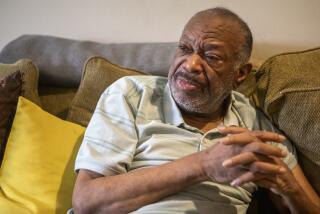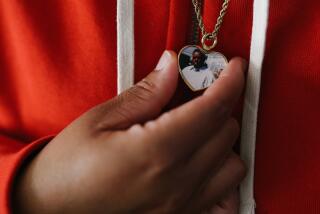Gigi Gordon dies at 54; crusading criminal defense lawyer
Gigi Gordon, a crusading criminal defense lawyer who battled corrupt police and overzealous prosecutors to free dozens of prisoners who had been wrongfully convicted, committed suicide after struggling with multiple sclerosis and depression. She was 54.
Gordon, who had been sinking deeper into despair over the last year as her debilitating illness eroded her intellect and medication failed to alleviate her pain, overdosed on pills and died Jan. 18 at a Brentwood park, her friends said.
Known for her fierce determination to fix what she saw as the flagrant ills of the criminal justice system, Gordon is credited with bringing attention to the misuse of jailhouse informants that led to many wrongful convictions.
Partly in response to her advocacy, legislative reforms to prevent jailhouse informants from being rewarded for false testimony began about a decade ago and were tightened last year.
“She changed the way criminal law was practiced in this county,” said her ex-husband, Andrew M. Stein, who also is a criminal defense lawyer. “People don’t realize how many people she set free.”
Gordon worked quietly in the background to challenge the convictions of those set up by corrupt investigators during the Los Angeles Police Department’s Rampart Division scandal in the late 1990s and the widespread misuse of jailhouse informants during the 1980s and ‘90s, Stein said.
“And it was never about her — it was always about the clients,” he said, describing Gordon as a “stealth warrior” for the rights of the poor and powerless.
The couple married in 1998 and divorced a decade later but remained close, jointly caring for their beloved dogs, Ali and Maya, Stein said.
Gordon was found dead in the back seat of her car at a park where the couple had regularly walked their dogs.
Gordon had a “brilliant mind” and read and wrote voraciously, and her inability to maintain those pursuits plunged her into depression, Stein said.
“She read at the speed of light — 20 books a month,” he said. “She was aware her mind was failing her. It was very difficult.”
In 2000, Gordon founded the Post-Conviction Assistance Center in Santa Monica and used it as command center as she tried to free victims of corruption and prosecutorial excess.
“The criminal justice system is nowhere near as perfect as the average person thinks it is,” Gordon said at a hearing in 2004 after DNA evidence exonerated a client, David Allen Jones, who had spent a decade in prison for three murders he didn’t commit.
Pasadena criminal defense lawyer Ron Kaye hailed Gordon as “an unstoppable force for justice” and credited her with exposing the misuse of informants that sent scores of defendants to prison for long terms, including his client Thomas Goldstein, who served 24 years before his wrongful conviction was quashed.
Gordon’s commitment to sparing criminal defendants from trumped-up charges and rigged evidence led a Los Angeles judge to appoint her to represent more than 2,000 suspected victims of the Rampart corruption scandal in which police were accused of widespread abuses.
The conviction in 2000 of three LAPD officers on corruption charges stemming from the Rampart scandal represented a watershed moment for justice in the city, Gordon said at the time and proclaimed, “In Los Angeles, a badge is no longer a shield” against accountability for cops who break the law.
A few years ago, Gordon also secured a commitment from Los Angeles County Dist. Atty. Steve Cooley to indefinitely preserve files and evidence in death-penalty cases and those resulting in life sentences, and to keep the records in other felony cases vital for post-conviction analysis for at least 25 years.
She lived much of the last year of her life on the Westside with her close friend and fellow criminal defense attorney Madelynn Kopple, who hired Gordon out of law school to help with the defense of murder suspects in a quadruple slaying at Bob’s Big Boy restaurant on La Cienega Boulevard on Dec. 14, 1980.
“Because of her absolutely brilliant writing skills, she was brought in on many capital cases” that required skillfully crafted and complex submissions, Kopple said.
“She was a great researcher, a great co-counsel. She was tireless, and she was the one lawyer you could call at 9 or 10 at night and she would never say she couldn’t talk. She’d want to know the whole story. She just really loved the law.”
Born Gilda Jay Gordon on Aug. 11, 1957, in New York City, Gordon earned a bachelor’s degree at State University of New York before moving to Los Angeles to attend Southwestern Law School.
Gordon’s survivors include a sister, Marcy Gordon of New York.
More to Read
Start your day right
Sign up for Essential California for the L.A. Times biggest news, features and recommendations in your inbox six days a week.
You may occasionally receive promotional content from the Los Angeles Times.





















































